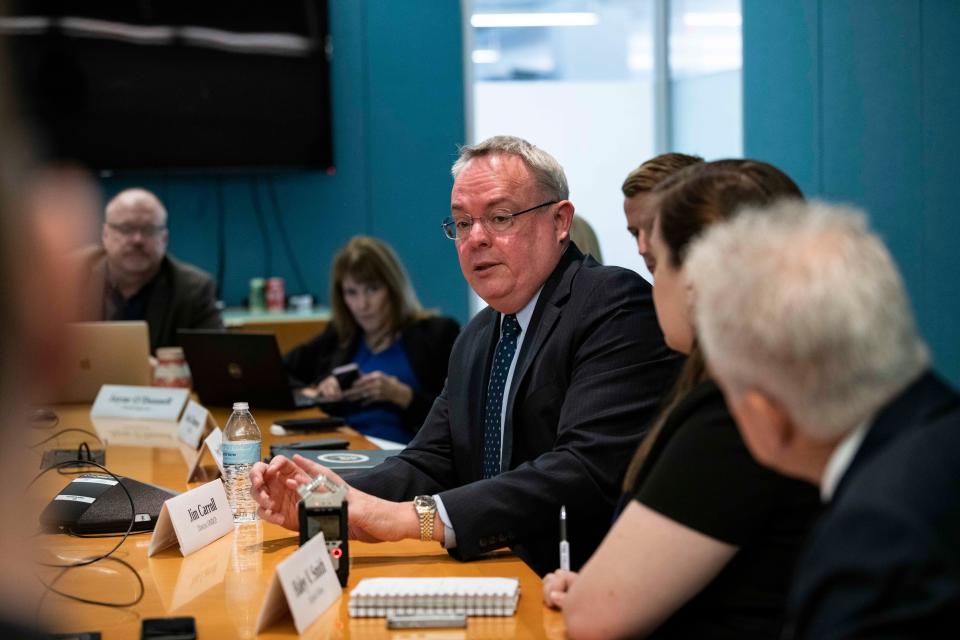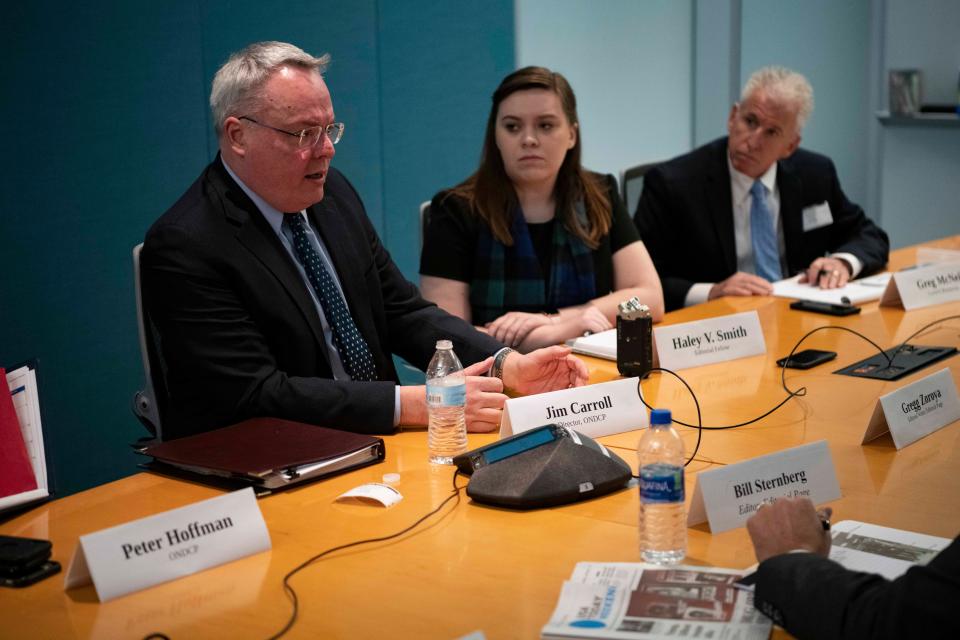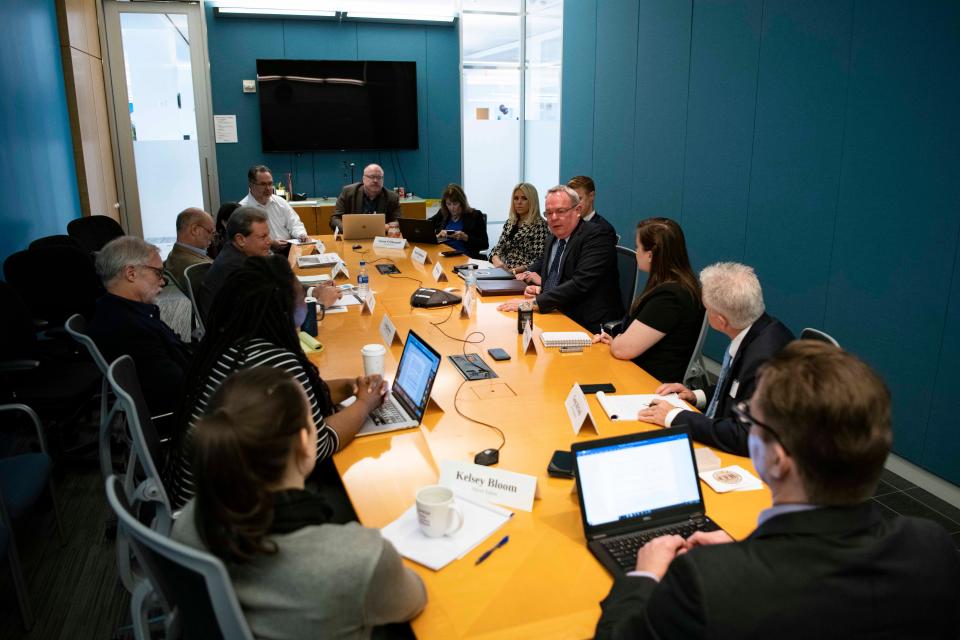Fentanyl coming directly from China to America has declined dramatically: Drug czar
His official title is director of the Office of National Drug Control Policy, but Jim Carroll is better known as the White House drug czar. He’s the direct adviser to the president on drug issues, and his office oversees $36 billion in federal spending. Carroll, a 57-year-old Washington attorney and former deputy White House chief of staff, met recently with the Editorial Board to discuss the opioid epidemic, marijuana legalization and other issues. Questions and answers have been edited for length and clarity:
Q. Your background is as a prosecutor and lawyer, not in public health. Why did you want this job?
A. My wife called me one day and said, you need to get home. I didn't know it, but a family member had an addiction, which started with a prescription. Thankfully the family member came to us and said, “I need help, I can't stop.” We got our family member into (a great detox) program. And that's why I wanted to go to the ONDCP, because I realized I was lucky.
Q. Were you worried about the stigma?
A. I was scared to tell (then-White House chief of staff) John Kelly that anyone in my family might have a drug problem. Once I got to ONDCP, I realized that it was really dumb to hide this. I've hired people in recovery.

Q. Earlier this fall, you went to China to check on Chinese efforts to crack down on the flow of deadly, illicit fentanyl into the United States. What did you conclude?
A. I'm cautiously optimistic. China does not want to be viewed as the drug dealer of the world. We've seen a dramatic decline in seizures of fentanyl coming directly from China to the United States. That being said, we're still seeing more or less the same volume of fentanyl coming into the U.S., but it's no longer coming directly from China. It is coming in from new places.
Q. What grade would you give to China’s response?
A. Maybe a B-minus overall. For inspection, I'll give them a C, and that's being generous probably, because they don't have the manpower to inspect 190,000 chemical companies.
Q. The USA TODAY Network recently reported on the rise of a Mexican drug lord called El Mencho, who leads a cartel known as CJNG (Cártel Jalisco Nueva Generación). How big a concern are he and his organization?
A. CJNG is a violent organization, and the violence that Mexico is experiencing is at an all-time high. When you look at some of the violence that's occurred just in the last few months — between attacks on the police, attacks on citizens and the willingness of any of these cartels to engage in civil unrest in order to prevent their leaders from being imprisoned, it is unprecedented. These are pretty horrific people.

Q. Is a border wall an effective way to keep drugs from Mexico out of the United States?
A. Absolutely. What a strong Southwest border does, and specifically a strong wall, it's a force multiplier. Instead of having people spread across the entire border, it allows (Border Patrol agents) to concentrate their efforts at the ports of entry.
Q. Don’t 90% of the drugs come through the established crossings?
A. Ninety percent of what is found comes through a port of entry. It's not 90% of what's trafficked. We don't know what we don't know.
Q. Do you support efforts to legalize marijuana?
A. Research will show us the harm and the benefit. I am fully supportive of research. We need better access for researchers. We need the ability to study this. We just have to be careful that we're not unleashing something before we know the medical impacts. When you look back to the opioid crisis, there were pharmaceutical companies pushing a drug out and saying, this isn't harmful, this is not addictive. And now we know the companies were not being fully forthright about it.
Q. Do you think decriminalizing crack cocaine would help get people into treatment more effectively?
A. No, I don't. I'm very concerned about decriminalizing any drug — meth, cocaine, any of the (illicit) opioids. We know these are bad drugs. We know that these are not beneficial drugs. Decriminalizaton would send out the wrong message that they're OK to take, which sadly, we know they're not.
Q. You’ve said you want to get away from the term opioid crisis. Why?
A. I don't like “opioid crisis” because I think really what we have is an addiction crisis. For so many of these people, they are turning to an illicit substance. It's a coping mechanism for something else going wrong in their life. And it develops into an addiction. That's what we need to think of this as. More and more people today are poly-drug users. They're very economically driven, and they are willing to accept a drug other than their primary drug of choice to help deal with inner pain, the addiction, things like that.
Q. What trends concern you?
A. I'm worried about meth. We don't have medication-assisted treatment available for meth addiction. We're working very closely with Health and Human Services to develop MAT, but we're not there yet.

Q. Millions and perhaps tens of billions of dollars could become available from settlements with drug companies that fueled the opioid epidemic. Is there a role for your office and the federal government in ensuring that that money goes for effective prevention and treatment?
A. I don't have an official role to play. I'm a big believer in community. This is a community effort. And communities have to be the ones who are really making the decisions on the best way to use these dollars. This has got to be community-based. That's the only way we're going to make a difference.
Q. Do you accept the current scientific conclusion that addiction is a chronic brain disorder, not a character flaw?
A. With all of my heart and soul. People who have an addiction have a medical condition. And it is a disease. The scientific evidence shows that.
Q. At a recent rally, President Donald Trump mocked Hunter Biden, who has a history of substance abuse problems, as a “loser.” Is that an appropriate message?
A. The president is very open about addiction in his family. He talks about his brother Fred dying of an (alcohol) addiction. The first time I met with him to talk to him about this job, he talked about his brother Fred, about remorse that he and his father weren't able to successfully save Fred. He's very compassionate on this issue.
Q. Can the government help someone find a quality addiction treatment center?
A. We have a new web site: findtreatment.gov. It's really cool. You can go into it. You put in your ZIP code. It's completely anonymous. You can find over 13,000 accredited treatment centers. You can select your preferred language, and if you want a faith-based program. There are all sorts of different options. You can find ones in your area really tailored to you.
This article originally appeared on USA TODAY: Fentanyl coming directly from China declined dramatically: Drug czar

